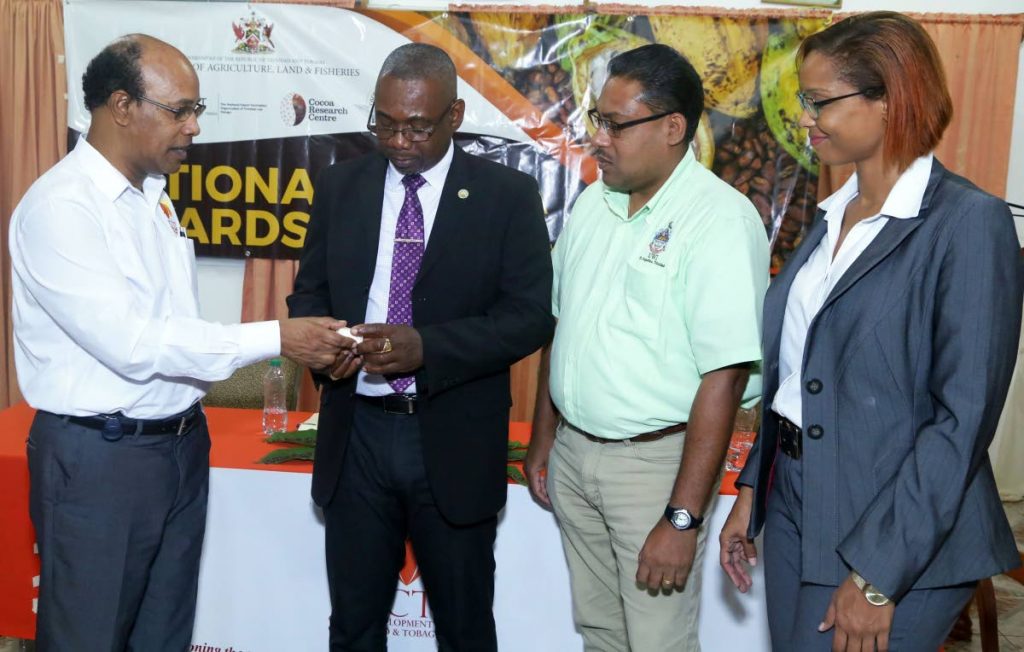Best cocoa in the world plagued by parrots

Parrots are the biggest challenge to growing cocoa in Tobago and any attempt to revive the industry must include a comprehensive plan to deal with these birds.
So said Secretary of Food Production, Forestry and Fisheries, Hayden Spencer, speaking at last Thursday’s launch of the National Cocoa Awards competition hosted by the Cocoa Development Company of TT and the Division of Food Production at the Blenheim Sheep Multiplication and Research project in Blenheim.
The competition seeks to drive improvements in the quality of local cocoa beans, both for the growing domestic value-added industry and for export.
Delivering the feature address at the event, Spencer said strategies were being explored to revive the industry, and deal with the parrots.
“There is still some remnant of cocoa production in Tobago. Today, it seems as though the common trend amongst farmers in Tobago is to reap whatever cocoa you can before the parrots get to it. This pest has emerged as the most challenging factor affecting cocoa production in Tobago and any attempts to resuscitate the industry must include a comprehensive plan.
“The Division through the Department of Natural Resources and Forestry has been exploring several strategies for dealing with the parrot problem and intends to merge these initiatives into an integrated pest management approach to bring relief not only to cocoa farmers but to all other farmers and householders so affected,” he said.
He pointed to a need for support for this project from all stakeholders and possibly institutional support from the Ministry of Agriculture in Trinidad and the University of the West Indies.
Saying that Tobago has the best tasting cocoa in the world, Spencer said the Division has initiated discussions with the Cocoa Research Centre of The UWI in St Augustine to conduct a flavour profile analysis of the repositories and possibly extend this service to cocoa farmers in Tobago.
“I have observed the brave and bold attempts by the Ministry of Agriculture and private cocoa estates in Trinidad to develop the domestic value-added chocolate industry - investing more in the bean-to-bar concept of producing our own high-quality chocolate. “This has tremendous potential in repositioning our country with respect to the cocoa industry by establishing our own identity and claiming the premium chocolate that the world has consumed for years,” he said, adding that opportunities exist for local cocoa producers, farmers and groups to maximise returns from their holdings in Tobago.
Chief Executive Officer of the Cocoa Development Company of TT, Leon Granger, speaking at the event, noted the decline of the industry in Tobago and advised that any attempt at revival must involve a multipronged approach.
“Just two days ago, an international company decided that they want to help Tobagonians, they would finance a special experiment and we would choose which estates we would use, couple government farms and couple private farms and run an experiment of how we could lower the population of the parrots.
“Anytime you are tackling one problem, you cannot attack it from one angle, it has to be a multipronged approach,” he said.
Granger also noted that the company has met with 1,165 cocoa farmers to date, but that only 40 of them were from Tobago.
“In 2009, when the competition, which is called “Cocoa of Excellence” was first hosted, one of the samples from Tobago actually won. You need to wake up and understand what you have, and it is time that you tell your children, because we are getting older, include it in your festivals, include it in your Heritage Festival for God sake that you have the best cocoa,” he said.
Manager of Business Development and Communication of the Cocoa Development Company, Gabriella Gonzales, in her welcome address, said the competition was an excellent way to restart the dialogue, interaction and moving forward, noting that for years now, cocoa have been identified as a critical driver of diversification.
Research Officer at the UWI’s Cocoa Research Centre, Dr Darin Sukha, who also sits on the tasting panel of the Cocoa Awards, also urged Tobago farmers to recognise the value of the cocoa produced on the island.
“Every country that you talk to, they say they have the best cocoa and we wanted to find a way to allow countries to bring the best of their soil forward. We don’t recognise the value of what we have, our cocoa reputation is something to behold. So, the whole point of this Cocoa of Excellence programme is to promote the unique origins, promote the unique varieties of a country towards business to business linkage and towards farmer professionalisation and you can only achieve that through good flavour and quality,” he said.
“The only way we can derive benefit from that is ultra-niche marketing of those beans and those beans converted in value added products such as chocolate, chocolate products and beyond chocolate. The award is really an opportunity for us to showcase Trinidad and Tobago, the quality that we have, showcasing and building the reputation that we have towards niche marketing, towards a more sustainable cocoa economy,” he said.

Comments
"Best cocoa in the world plagued by parrots"